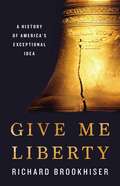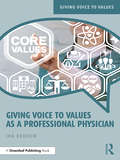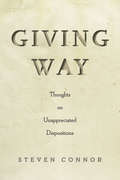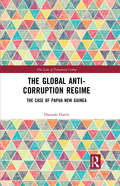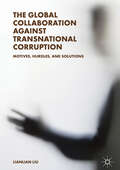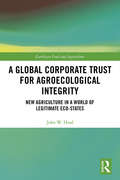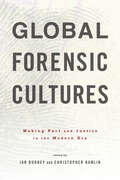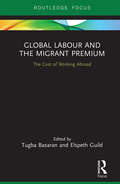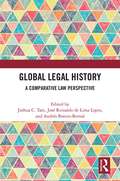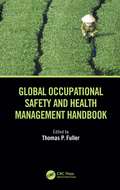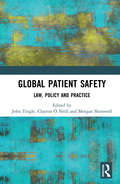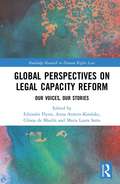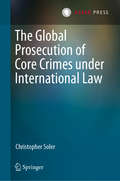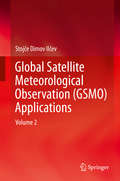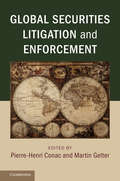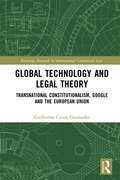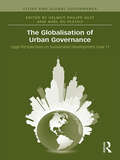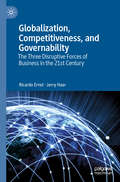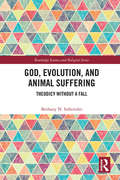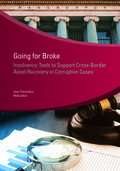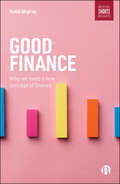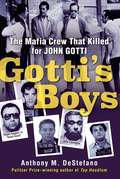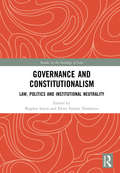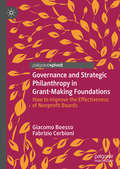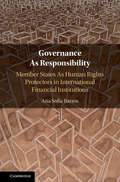- Table View
- List View
Give Me Liberty: A History of America's Exceptional Idea
by Richard BrookhiserAn award-winning historian recounts the history of American liberty through the stories of thirteen essential documentsNationalism is inevitable: It supplies feelings of belonging, identity, and recognition. It binds us to our neighbors and tells us who we are. But increasingly -- from the United States to India, from Russia to Burma -- nationalism is being invoked for unworthy ends: to disdain minorities or to support despots. As a result, nationalism has become to many a dirty word.In Give Me Liberty, award-winning historian and biographer Richard Brookhiser offers up a truer and more inspiring story of American nationalism as it has evolved over four hundred years. He examines America's history through thirteen documents that made the United States a new country in a new world: a free country. We are what we are because of them; we stay true to what we are by staying true to them.Americans have always sought liberty, asked for it, fought for it; every victory has been the fulfillment of old hopes and promises. This is our nationalism, and we should be proud of it.
Giving Voice to Values as a Professional Physician: An Introduction to Medical Ethics (Giving Voice to Values)
by Ira BedzowGiving Voice to Values as a Professional Physician provides students with the theoretical background and practical applications for acting on their values in situations of ethical conflict. It is the first medical ethics book that utilizes the Giving Voice to Values methodology to instruct students in medical ethics and professionalism. In doing so, it shifts the focus of ethics education from intellectually examining ethical theories and conflicts to emphasizing moral action. Each section of the book explains how moral decision-making and action can be implemented in the healthcare arena. Medical ethics cases are provided throughout in order to assist students in giving voice to their values and developing skills for professional action. The Giving Voice to Values methodology, and the cases in this book, do not focus on the big questions of academic ethics, but rather on the ethics of the everyday, even if the challenges presented are difficult. In other words, the ethical questions students will have to face, in this book and in medical education and practice, are about how to interact with others, whether they be patients or colleagues, who might have different ethical positions. The book provides a unique guide for professional identity formation and the teaching of ethics in medical schools.
Giving Way: Thoughts on Unappreciated Dispositions
by Steven ConnorIn a world that promotes assertion, agency, and empowerment, this book challenges us to revalue a range of actions and attitudes that have come to be disregarded or dismissed as merely passive. Mercy, resignation, politeness, restraint, gratitude, abstinence, losing well, apologizing, taking care: today, such behaviors are associated with negativity or lack. But the capacity to give way is better understood as positive action, at once intricate and demanding. Moving from intra-human common courtesies, to human-animal relations, to the global civility of human-inhuman ecological awareness, the book's argument unfolds on progressively larger scales. In reminding us of the existential threat our drives pose to our own survival, Steven Connor does not merely champion a family of behaviors; he shows that we are more adept practitioners of them than we realize. At a time when it is on the wane, Giving Way offers a powerful defense of civility, the versatile human capacity to deflect aggression into sociability and to exercise power over power itself.
The Global Anti-Corruption Regime: The Case of Papua New Guinea (The Law of Financial Crime)
by Hannah HarrisThis book tackles the challenging topic of corruption. It explores the evolution of a global prohibition regime against corrupt activity (the global anti-corruption regime). It analyses the structure of the transnational legal framework against corruption, evaluating the impact of global anti-corruption efforts at a national level. The book focuses on the United Nations Convention against Corruption (UNCAC) as the primary tool of the global anti-corruption regime. It provides new and engaging material gathered in the field, including first-hand accounts from actors at international, regional, and domestic levels. By documenting the experiences of diverse actors, the book makes a substantial contribution to literature on corruption and anti-corruption efforts. Synthesising empirical research with an exploration of theoretical literature on corruption and regime evolution results in novel suggestions for improvement of the global anti-corruption regime and its legal tools. The Global Anti-Corruption Regime is a well-rounded text with a wealth of new information that will be valuable to both academic and policy audiences. It clarifies the factors that prevent current anti-corruption efforts from successfully eliminating corrupt activity and applies the five-stage model of global prohibition regime evolution to the global anti-corruption regime. It will be of interest to researchers, academics, policymakers, and students interested in anti-corruption law, comparative law, transnational criminal law, international law, international relations, politics, economics, and trade.
The Global Collaboration against Transnational Corruption: Motives, Hurdles, and Solutions
by Lianlian LiuThis book articulates and explores the realities of contemporary international anti-corruption law. As corruption has increasingly become a major topic in international affairs, Liu analyzes the global collaboration against transnational bribery. As China's economic reforms are increasingly articulated in a language of law, governmentality, and anti-corruption, it is essential that scholars, policymakers and legal theorists around the world understand the issues at stake. In this elegant text, Liu lays out the issues clearly, establishes methodologies for analysis, and provides policy proposals for the years to come.
A Global Corporate Trust for Agroecological Integrity: New Agriculture in a World of Legitimate Eco-states (Earthscan Food and Agriculture)
by John W. HeadThis book examines global environmental governance and how legal, institutional, and conceptual reform can facilitate a transformation to a new ‘natural-systems’ form of agriculture. Profound global climate disruption makes it essential that we replace our current agricultural system – described in this book as a fossil-carbon-dependent ‘modern extractive agriculture’ – with a natural-systems agriculture featuring perennial grains growing in polycultures, thereby mimicking the natural grassland and forest ecosystems that modern extractive agriculture has largely destroyed. After examining relevant international legal and conceptual foundations (sovereignty, federalism, global governance) and existing international organizations focusing on agriculture, the book explores legal and institutional opportunities to facilitate dramatic agricultural reform and ecological restoration. Among other things, it explains how innovative federalism structures around the world provide patterns for reorienting global environmental governance, including what the book calls eco-states that would, through exercise of pluralistic sovereignty, be responsible for agroecological management. Drawing from his experience working in international institutions, the author provides detailed global-governance proposals for facilitating the type of agricultural reform that can help avoid ecological collapse, especially through soil degradation and climate change. This book will be of great interest to students and scholars of international law, agroecology, climate change, ecological restoration, sustainable development, and global governance, as well as policy-makers and practitioners working in these fields.
Global Forensic Cultures: Making Fact and Justice in the Modern Era
by Ian Burney and Christopher HamlinEssays explore forensic science in global and historical context, opening a critical window onto contemporary debates about the universal validity of present-day genomic forensic practices.Contemporary forensic science has achieved unprecedented visibility as a compelling example of applied expertise. But the common public view—that we are living in an era of forensic deliverance, one exemplified by DNA typing—has masked the reality: that forensic science has always been unique, problematic, and contested. Global Forensic Cultures aims to rectify this problem by recognizing the universality of forensic questions and the variety of practices and institutions constructed to answer them.Groundbreaking essays written by leaders in the field address the complex and contentious histories of forensic techniques. Contributors also examine the co-evolution of these techniques with the professions creating and using them, with the systems of governance and jurisprudence in which they are used, and with the socioeconomic, political, racial, and gendered settings of that use. Exploring the profound effect of "location" (temporal and spatial) on the production and enactment of forms of forensic knowledge during the century before CSI became a household acronym, the book explores numerous related topics, including the notion of burden of proof, changing roles of experts and witnesses, the development and dissemination of forensic techniques and skills, the financial and practical constraints facing investigators, and cultures of forensics and of criminality within and against which forensic practitioners operate.Covering sites of modern and historic forensic innovation in the United States, Europe, and farther-flung imperial and global settings, these essays tell stories of blood, poison, corpses; tracking persons and attesting documents; truth-making, egregious racism, and sinister surveillance. Each chapter is a finely grained case study. Collectively, Global Forensic Cultures supplies a historical foundation for the critical appraisal of contemporary forensic institutions which has begun in the wake of DNA-based exonerations.Contributors: Bruno Bertherat, José Ramón Bertomeu Sánchez, Binyamin Blum, Ian Burney, Marcus B. Carrier, Simon A. Cole, Christopher Hamlin, Jeffrey Jentzen, Projit Bihari Mukharji, Quentin (Trais) Pearson, Mitra Sharafi, Gagan Preet Singh, Heather Wolffram
Global Labour and the Migrant Premium: The Cost of Working Abroad (Routledge Studies in Liberty and Security)
by Tugba Basaran Elspeth GuildThis book provides the first systematic account of the premium costs that migrants pay to live and work abroad. Reducing the costs of international labour migration, specifically worker-paid costs for low-skilled employment, has become an important item on the global agenda over the last years and is particularly pertinent for the UN’s Global Compact on Safe, Orderly and Regular Migration. Recruitment costs alone amount in most migration corridors to anywhere between one and ten months of foreign earnings and many migrants may well lose between one and two years of foreign earnings, if all costs are considered. This book is intended as a primer for evidence-based policy for reducing the costs of international labour mobility. The contributors include academics from law, economics and politics, but also authors from international organizations, non-governmental organizations, as well as the voices of migrants. The hope of the editors is that this small collection sets the basis for evidence-based policies that seek to reduce the costs of international migration. This book will be of interest to scholars and students of migration, globalization, law, sociology and international relations, as well as practitioners and policy makers.
Global Legal History: A Comparative Law Perspective
by Joshua C. Tate José Reinaldo de Lima Lopes Andrés Botero-BernalThis collection brings together a group of international legal historians to further scholarship in different areas of comparative and regional legal history. Authors are drawn from Europe, Asia, and the Americas to produce new insights into the relationship between law and society across time and space. The book is divided into three parts: legal history and legal culture across borders, constitutional experiences in global perspective, and the history of judicial experiences. The three themes, and the chapters corresponding to each, provide a balance between public law and private law topics, and reflect a variety of methodologies, both empirical and theoretical. The volume highlights the gains that may be made by comparing the development of law in different countries and different time periods. The book will be of interest to an international readership in Legal History, Comparative Law, Law and Society, and History.
Global Occupational Safety and Health Management Handbook
by Thomas FullerThis book was written with the belief that everyone globally has the right to a safe and healthy workplace. An 8-year old carrying bricks in the mid-day sun in Nepal, a pharmaceutical business executive on assignment in Bangladesh, or a mother polishing stone in her home in Tanzania; each has a fundamental right to a workplace free from risk of injury, illness, and death. <p><p> Global Occupational Safety and Health Management Handbook is a broad presentation and discussion of the issues and obstacles facing the Occupational Safety and Health (OSH) profession today in providing safe workplaces globally. Readers can use this book to find resources to assist in the development of their programs and to become informed about the basic structures of international OSH development and governance. Readers can also rely on this book to become more aware of global OSH issues and problems that they may be personally or professionally willing and able to help address. Seasoned OSH professionals can expect to learn about new ways to look at complicated and controversial topics. Young professionals and students can read this book to better understand the important global OSH interrelationships and challenges of the future. <p><p> Features <li>Serves as a one-stop resource for information on important international safety and health topics and issues <li>Provides detailed information about international OSH tripartite, nongovernmental, and professional organizations <li>Describes the various global OSH educational and professional development needs, and international approaches to expanding capacity and awareness of the profession <li>Discusses controversial international OSH working conditions and explains their global impacts
Global Patient Safety: Law, Policy and Practice
by John Tingle Clayton Ó Néill Morgan ShimwellThis book explores patient safety themes in developed, developing and transitioning countries. A foundation premise is the concept of ‘reverse innovation’ as mutual learning from the chapters challenges traditional assumptions about the construction and location of knowledge. This edited collection can be seen to facilitate global learning. This book will, hopefully, form a bridge for those countries seeking to enhance their patient safety policies. Contributors to this book challenge many supposed generalisations about human societies, including consideration of how medical care is mediated within those societies and how patient safety is assured or compromised. By introducing major theories from the developing world in the book, readers are encouraged to reflect on their impact on the patient safety and the health quality debate. The development of practical patient safety policies for wider use is also encouraged. The volume presents a ground-breaking perspective by exploring fundamental issues relating to patient safety through different academic disciplines. It develops the possibility of a new patient safety and health quality synthesis and discourse relevant to all concerned with patient safety and health quality in a global context.
Global Perspectives on Legal Capacity Reform: Our Voices, Our Stories (Routledge Research in Human Rights Law)
by Eilionóir Flynn Anna Arstein-Kerslake Clíona De Bhailís Maria Laura SerraThis edited collection is the result of the Voices of Individuals: Collectively Exploring Self-determination (VOICES) based at the Centre for Disability Law and Policy, National University of Ireland Galway. Focusing on the exercise of legal capacity under Article 12 of the UN Convention on the Rights of Persons with Disabilities, the stories of people with disabilities are combined with responses from scholars, activists and practitioners, addressing four key areas: criminal responsibility, contracts, consent to sex, and consent to medical treatment. Sustainable law and policy reforms are set out based on the storytellers’ experiences, promoting a recognition of legal capacity and supported decision-making. The perspectives are from across a wide range of disciplines (including law, sociology, nursing, and history) and 13 countries. The volume is a valuable resource for researchers, academics and legislators, judges or policy makers in the area of legal capacity and disability. It is envisaged that the book will be particularly useful for those engaged in legal capacity law reform processes worldwide and that this grounded work will be of great interest to legislators and policy makers who must frame new laws on supported decision making in compliance with the UNCRPD.
The Global Prosecution of Core Crimes under International Law
by Christopher SolerThis book deals with the prosecution of core crimes and constitutes the first comprehensive analysis of the horizontal and vertical systems of enforcement of international criminal law and of their inter-relationship. It provides a global jurisprudential exposition in assessing the grounds for refusal of surrender to the International Criminal Court and of extradition to another State. It also offers insights into legal perspectives which improve the prevailing enforcement regimes of various models of criminal justice, including hybrid criminal tribunals, special criminal courts, judicial panels and partnerships, and other budding sui generis judicial and/or prosecutorial institutions. The book espouses a human rights law-oriented critique to the enforcement of domestic, regional and international criminal justice and is aimed at legal practitioners (prosecutors, defence lawyers, magistrates and judges), jurists, criminal justice experts, penologists, legal researchers, human rights activists and law students.Christopher Soler lectures Maltese criminal law, international criminal law and public international law at the University of Malta. He obtained his Ph.D. from the University of Amsterdam in The Netherlands.
Global Satellite Meteorological Observation (GSMO) Applications: Volume 2
by Stojče Dimov IlčevThis book presents principal structures of space systems functionality of meteorological networks, media and applications for modern remote sensing, transmission systems, meteorological ground and users segments and transferring weather data from satellite to the ground infrastructures and users. The author presents techniques and different modes of satellite image interpretation, type of satellite imagery, spectral imaging properties, and enhancement of imaging technique, geo-location and calibration, atmospheric and surface phenomena. Several satellite meteorological applications are introduced including common satellite remote sensing applications, weather analysis, warnings and prediction, observation and measurements of meteorological variables, atmosphere and surface applications, ocean and coastal applications, land, agriculture and forestry applications, and maritime and aviation satellite weather applications. The author also covers ground segment and user segment in detail. The final chapter looks to the future, covering possible space integrations in meteorological and weather observation.This is a companion book of Global Satellite Meteorological Observation Theory (Springer), which provides the following topics:Evolution of meteorological observations and history satellite meteorologySpace segment with satellite orbits and meteorological payloadsAnalog and digital transmission, type of modulations and broadcasting systemsAtmospheric radiation, satellite meteorological parameters and instrumentsMeteorological antenna systems and propagation
Global Securities Litigation and Enforcement
by Pierre-Henri Conac Martin GelterGlobal Securities Litigation and Enforcement provides a clear and exhaustive description of the national regime for the enforcement of securities legislation in cases of misrepresentation on financial markets. It covers 29 jurisdictions worldwide, some of them are important although their law is not well known. It will be an invaluable resource for academics and students of securities litigation, as well as for lawyers, policy-makers and regulators. The book also provides a comprehensive contribution debate on whether public or private enforcement is preferable in terms of development of securities markets. It will appeal to those interested in the legal origins theory and in comparative securities law, and shows that the classification of jurisdictions within legal families does not explain the differences in legal regimes. While US securities law often serves as a model for international convergence, some of its elements, such as securities class actions, have not been adopted worldwide.
Global Technology and Legal Theory: Transnational Constitutionalism, Google and the European Union (Routledge Research in International Commercial Law)
by Guilherme Cintra GuimarãesThe rise and spread of the Internet has accelerated the global flows of money, technology and information that are increasingly perceived as a challenge to the traditional regulatory powers of nation states and the effectiveness of their constitutions. The acceleration of these flows poses new legal and political problems to their regulation and control, as shown by recent conflicts between Google and the European Union (EU). <P><P> This book investigates the transnational constitutional dimension of recent conflicts between Google and the EU in the areas of competition, taxation and human rights. More than a simple case study, it explores how the new conflicts originating from the worldwide expansion of the Internet economy are being dealt with by the institutional mechanisms available at the European level. The analysis of these conflicts exposes the tensions and contradictions between, on the one hand, legal and political systems that are limited by territory, and, on the other hand, the inherently global functioning of the Internet. The EU’s promising initiatives to extend the protection of privacy in cyberspace set the stage for a broader dialogue on constitutional problems related to the enforcement of fundamental rights and the legitimate exercise of power that are common to different legal orders of world society. Nevertheless, the different ways of dealing with the competition and fiscal aspects of the conflicts with Google also indicate the same limits that are generally attributed to the very project of European integration, showing that the constitutionalization of the economy tends to outpace the constitutionalization of politics. <P><P> Providing a detailed account of the unfolding of these conflicts, and their wider consequences to the future of the Internet, this book will appeal to scholars working in EU law, international law and constitutional law, as well as those in the fields of political science and sociology.
The Globalisation of Urban Governance: Legal Perspectives On Sustainable Development Goal 11 (Cities and Global Governance)
by Helmut Philipp Aust Anél Du PlessisThe adoption of the Sustainable Development Goals (SDGs) by the UN General Assembly in 2015 represents the latest attempt by the international community to live up to the challenges of a planet that is out of control. Sustainable Development Goal 11 envisages inclusive, safe, resilient and sustainable cities around the world by the year 2030. This globally agreed vision is part of a trend in international policy toward good urban governance, and now awaits implementation. Fourteen original contributions collectively examine how this global vision has been developed on a conceptual level, how it plays out in various areas of (global) urban governance and how it is implemented in varying local contexts. The overarching hypothesis presented herein is that SDG 11 proves that local governance is recognised as an autonomous yet interrelated part of the global pursuit of sustainable development. The volume analyses three core questions: How have the normative ideals set forth in SDG 11 been developed? What are the meanings of the four sub-goals of SDG 11 and how do these relate to each other? What does SDG 11 imply for urban law and governance in the domestic context and how are local processes of urban governance internationalised? The Globalisation of Urban Governance makes an important scholarly contribution by linking the narrative on globalisation of good urban governance in various social sciences with legal discourse. It considers global governance and connects the existing debate about cities and their place in global governance with some of the most pertinent questions that lawyers face today.
Globalization, Competitiveness, and Governability: The Three Disruptive Forces of Business in the 21st Century
by Ricardo Ernst Jerry HaarThis book argues that three powerful symbiotic forces (globalization, competitiveness, and governability) are disrupting business in the 21st century, resulting in an impact on the economic and business environment far greater than the effects of any of these three individually. Both globalization and competitiveness are governed essentially by market forces that force the introduction of significant changes aimed at increasing efficiency so that a better use may be made of the advantages of globalization (i.e., the traditional “invisible” hand). Responsibility for bringing about these changes lies not only with the private sector but also with the government (i.e., the “visible” hand). Readers will find in this book an explanation of how globalization, competitiveness, and governability define the context of global business.
God, Evolution, and Animal Suffering: Theodicy without a Fall (Routledge Science and Religion Series)
by Bethany N. SollerederAfter the publication of On the Origin of Species in 1859, theologians were faced with the dilemma of God creating through evolution. Suddenly, pain, suffering, untimely death and extinction appeared to be the very tools of creation, and not a result of the sin of humanity. Despite this paradigm shift, the question of non-human suffering has been largely overlooked within theodicy debates, overwhelmed by the extreme human suffering of the twentieth century. This book redresses this imbalance by offering a rigorous academic treatment of the questions surrounding God and the suffering of non-human animals. Combining theological, philosophical, and biblical perspectives, this book explores the relationship between God and Creation within Christian theology. First it dismantles the popular theological view that roots violence and suffering in the animal kingdom in the fall of humanity. Then, through an exploration of the nature of love, it affirms that there are multiple reasons to suggest that God and creation can both be "good", even with the presence of violence and suffering. This is an innovative exploration of an under-examined subject that encompasses issues of theology, science, morality and human-animal interactions. As such, it will be of keen interest to scholars and academics of religion and science, the philosophy of religion, theodicy, and biblical studies.
Going for Broke: Insolvency Tools to Support Cross-Border Asset Recovery in Corruption Cases (StAR Initiative)
by Jean-Pierre Brun Molly SilverGoing for Broke focuses on insolvency as an additional civil remedy in the arsenal of asset recovery practitioners, specifically in the context of grand corruption investigations and proceedings. The recovery of corruption proceeds is often sought through criminal prosecution and confiscation or civil lawsuits. Insolvency proceedings can also be an effective mechanism in the right circumstances, with their own advantages and disadvantages. The scenario that is most likely to benefit from this type of remedy is one in which bribes and stolen funds have been routed through special-purpose companies. This guidebook is intended as a practical tool to help policy makers, public officials, and those who have been entrusted with recovering their nations' stolen assets. It informs them about the ways that insolvency can be used to pursue proceeds of corruption. It may also serve as a quick reference for other practitioners: insolvency professionals, auditors, financial institutions, in-house counsel, and other professionals who deal with corruption.
Good Finance: Why We Need a New Concept of Finance
by Vedat AkgirayJust as we need good food for good health, so too do we need ‘good finance’ for social and economic wellness. In this book, Vedat Akgiray presents a timely critique of extreme financialisation, of the economics profession’s flawed modelling approach and the continuing blind faith in the efficient market hypothesis. Outlining the causes of financial crises and their socioeconomic effects, Good Finance puts the issues into perspective. It offers a clear platform upon which our current concept of finance can be revised for the good of society.
Gotti's Boys: The Mafia Crew That Killed For John Gotti
by Anthony DeStefanoThey called him the "Teflon Don." But in his short reign as the head of the Gambino crime family, John Gotti wracked up a lifetime of charges from gambling, extortion, and tax evasion to racketeering, conspiracy, and five convictions of murder. He didn't do it alone. Surrounding himself with a rogues gallery of contract killers, fixers, and enforcers, he built one of the richest, most powerful crime empires in modern history. Who were these men? Pulitzer Prize-winning journalist Anthony M. DeStefano takes you inside Gotti's inner circle to reveal the dark hearts and violent deeds of the most remorseless and cold-blooded characters in organized crime. Men so vicious even the other Mafia families were terrified of them. Meet Gotti's Boys . . .
Governance and Constitutionalism: Law, Politics and Institutional Neutrality (Studies in the Sociology of Law)
by Bogdan Iancu Elena Simina TănăsescuThis collection studies the rise of neutral bodies as a challenge to the constitutional paradigm of the nation state. Administrative entities such as commissions, agencies, councils, authorities or ‘independent agencies’ as they are sometimes known, are relatively autonomous from majoritarian democratic control and by their institutional design fall outside the classical triad of powers or branches of government. They may even fall outside the confines of the nation state itself as with the EU Commission. The book is divided into theoretical-historical and empirical parts. Part I approaches the phenomenon through the rigorous normative conceptual lens of constitutionalism and constitutional law, questioning the implications of political neutrality on inherited normative categories, both at national and supranational level. Part II comprises case-studies reflecting the full spectrum of theoretical frameworks and concerns developed and explored by the theory-oriented chapters in the first part. The work explores a wide range of issues including the balance between autonomy, legitimacy and accountability, the taxonomy of agencies, the role and limits of expertise as a paramount justification for independence, ‘agentification’ as a result of internationalisation, and ‘agentification’ as a reflex and consequence of transnational polity-building within the EU.
Governance and Strategic Philanthropy in Grant-Making Foundations: How to Improve the Effectiveness of Nonprofit Boards
by Giacomo Boesso Fabrizio CerbioniThis book discusses the role of grant-making foundations in supporting local communities, and how effective governance can contribute to greater success of the social projects they finance. The book considers the extent to which granting foundations act as social investment banks or strategic philanthropists, and identifies possible areas of evolution and improvement in the granting process of foundations similar to other innovative firms. It seeks to explore the possibility of foundations becoming a reference point in the Third Sector for innovativeness and risk taking.
Governance As Responsibility: Member States As Human Rights Protectors in International Financial Institutions
by Ana Sofia BarrosThis book undertakes a specialised analysis of a topic that is highly significant both theoretically and practically. At the theoretical level, it discusses questions that have remained insufficiently answered in the fields of international human rights and institutional law. Notably, it clarifies how international human rights law conditions member states' governance role within international financial institutions and how this role is to be accommodated in the regime of international responsibility. Furthermore, the book's thorough discussion of member states' human rights due diligence duties offers a practical contribution to the understanding of what tools may be used by states to secure their human rights obligations when participating in international financial institutions. Its practical significance also relates to the examination of the various elements that must be demonstrated by an individual wishing to invoke member State responsibility for alleged human rights violations in the context of international financial institution operations.
